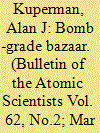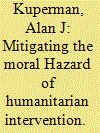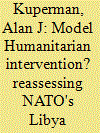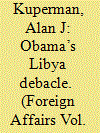|
|
|
Sort Order |
|
|
|
Items / Page
|
|
|
|
|
|
|
| Srl | Item |
| 1 |
ID:
068570


|
|
|
| 2 |
ID:
168046


|
|
|
|
|
| Summary/Abstract |
The rebellion in Libya was led by Islamist veterans of wars in the Middle East. Thus, the United States and its allies, not realizing it at the time, intervened to support a group of terrorists.
|
|
|
|
|
|
|
|
|
|
|
|
|
|
|
|
| 3 |
ID:
162108


|
|
|
| 4 |
ID:
081551


|
|
|
|
|
| Publication |
2008.
|
| Summary/Abstract |
The emerging norm of humanitarian intervention, or the Responsibility to Protect, resembles a social insurance policy to protect ethnic groups against genocide and ethnic cleansing. If a state perpetrates such genocidal violence, the norm calls for a payout-up to and including military intervention-to protect the group and ensure its security, often by enhancing its autonomy from the state. Unfortunately, this leads to a common pathology of insurance-moral hazard-whereby the expected payout for a loss unintentionally encourages excessively risky or fraudulent behavior. Thus, some militants may rebel despite the risk of provoking state retaliation, because they expect any resulting atrocities to attract intervention that facilitates their rebellion. This article summarizes recently published evidence for this dynamic, explores the feasibility of adapting insurance strategies that mitigate moral hazard, and then proposes a reform of humanitarian intervention based on the most feasible of these adapted strategies.
|
|
|
|
|
|
|
|
|
|
|
|
|
|
|
|
| 5 |
ID:
122087


|
|
|
|
|
| Publication |
2013.
|
| Summary/Abstract |
NATO's 2011 humanitarian military intervention in Libya has been hailed as a model for implementing the emerging norm of the responsibility to protect (R2P), on grounds that it prevented an impending bloodbath in Benghazi and facilitated the ouster of Libya's oppressive ruler, Muammar al-Qaddafi, who had targeted peaceful civilian protesters. Before the international community embraces such conclusions, however, a more rigorous assessment of the net humanitarian impact of NATO intervention in Libya is warranted. The conventional narrative is flawed in its portrayal of both the nature of the violence in Libya prior to the intervention and NATO's eventual objective of regime change. An examination of the course of violence in Libya before and after NATO's action shows that the intervention backfired. The intervention extended the war's duration about sixfold; increased its death toll approximately seven to ten times; and exacerbated human rights abuses, humanitarian suffering, Islamic radicalism, and weapons proliferation in Libya and its neighbors. If it is a "model intervention," as senior NATO officials claim, it is a model of failure. Implementation of R2P must be reformed to address these unintended negative consequences and the dynamics underlying them. Only then will R2P be able to achieve its noble objectives.
|
|
|
|
|
|
|
|
|
|
|
|
|
|
|
|
| 6 |
ID:
082057


|
|
|
|
|
| Publication |
2008.
|
| Summary/Abstract |
This article explores a perverse consequence of the emerging norm of humanitarian intervention, or "Responsibility to Protect," contrary to its intent of protecting civilians from genocide and ethnic cleansing. The root of the problem is that such genocidal violence often represents state retaliation against a substate group for rebellion (such as an armed secession) by some of its members. The emerging norm, by raising expectations of diplomatic and military intervention to protect these groups, unintentionally fosters rebellion by lowering its expected cost and increasing its likelihood of success. In practice, intervention does sometimes help rebels attain their political goals, but usually it is too late or inadequate to avert retaliation against civilians. Thus, the emerging norm resembles an imperfect insurance policy against genocidal violence. It creates moral hazard that encourages the excessively risky or fraudulent behavior of rebellion by members of groups that are vulnerable to genocidal retaliation, but it cannot fully protect against the backlash. The emerging norm thereby causes some genocidal violence that otherwise would not occur. Bosnia and Kosovo illustrate that in at least two recent cases the moral-hazard hypothesis explains why members of a vulnerable group rebelled and thereby triggered genocidal retaliation. The article concludes by exploring whether potential interveners could mitigate genocidal violence by modifying their intervention policies to reduce moral hazard
|
|
|
|
|
|
|
|
|
|
|
|
|
|
|
|
| 7 |
ID:
137576


|
|
|
|
|
| Summary/Abstract |
On March 17, 2011, the UN Security Council passed Resolution 1973, spearheaded by the administration of U.S. President Barack Obama, authorizing military intervention in Libya. The goal, Obama explained, was to save the lives of peaceful, pro-democracy protesters who found themselves the target of a crackdown by Libyan dictator Muammar al-Qaddafi. Not only did Qaddafi endanger the momentum of the nascent Arab Spring, which had recently swept away authoritarian regimes in Tunisia and Egypt, but he also was poised to commit a bloodbath in the Libyan city where the uprising had started, said the president. “We knew that if we waited one more day, Benghazi—a city nearly the size of Charlotte—could suffer a massacre that would have reverberated across the region and stained the conscience of the world,” Obama declared. Two days after the UN authorization, the United States and other NATO countries established a no-fly zone throughout Libya and started bombing Qaddafi’s forces. Seven months later, in October 2011, after an extended military campaign with sustained Western support, rebel forces conquered the country and shot Qaddafi dead.
|
|
|
|
|
|
|
|
|
|
|
|
|
|
|
|
|
|
|
|
|